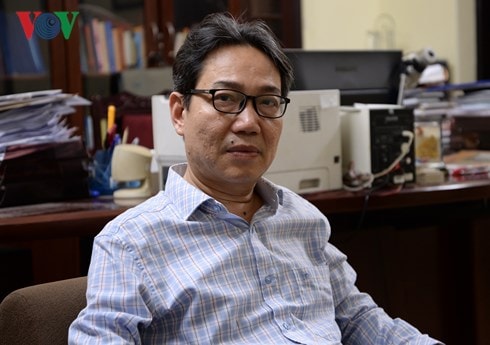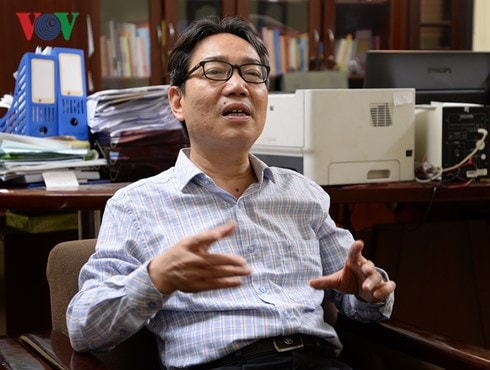We must deal with the "huge" assets of officials, we cannot just stand by and watch.
It is difficult to attribute assets of unexplained origin as illegal. However, we should not apply the old way of thinking and see the loss of State assets.
It can be said that the proposal to collect taxes up to 45% of the total value of assets of unexplained origin in the draft Law on Anti-Corruption (amended) is a step forward when the mansions and "huge" assets of officials have long been untouched despite causing public outrage. However, there are also opinions that tax collection may lead to the risk of legalizing assets obtained through corruption. However, according to Dr. Dinh Van Minh, Director of the Institute of Inspection Science (Government Inspectorate), assets of unexplained origin are not necessarily illegal assets.
|
| Dr. Dinh Van Minh, Director of the Institute of Inspection Science (Government Inspectorate) |
It is difficult to attribute "huge" assets as illegal.
According to Dr. Dinh Van Minh, this tax proposal should be seen as one of the Government's efforts to deal with unexplained assets when proving that the assets and income of many officials are illegal and originate from corruption is still an unsolved problem.
In reality in Vietnam today, the State is almost unable to manage all the input income of civil servants, not to mention the whole society. In addition to salary, civil servants have many other legal sources of income. A Department leader can attend dozens of meetings each month, often receiving "training", or professors and doctors have fees for teaching, participating in topics and projects... Those amounts are mainly money from the budget, not given by anyone.
In fact, many active civil servants, who seize the luck and opportunities in the stock market, real estate, etc., have earned profits many times larger than their salaries. And if they “hit the jackpot,” they can own several hundred million to even billions of dong. Therefore, many civil servants not only “live well” but can also buy houses and cars.
The Director of the Institute of Inspection Science also acknowledged the reality of our society today, because of having "huge" assets that with just a civil servant's salary they could never dream of, many people do not want to "show off" to the world to avoid scrutiny; many people want to "hide" them to serve personal purposes, so there are civil servants who hide them to avoid tax obligations and people who "accidentally" evade taxes.
“It is not acceptable to conceal or not fully declare assets and income to avoid fulfilling obligations to the State. But conversely, it is also not possible to conclude that those assets are illegal,” the Director affirmed.
“Society has the right to question the income and “huge” assets of officials, but lawmakers cannot look at it in a simple way. As long as it is not proven that the assets they have are illegal, in principle, they must still assume that the assets are legal. Even if people cannot explain the origin of their assets, they cannot be recovered because the responsibility to prove it is the State’s. A state under the rule of law cannot assume guilt,” Mr. Minh further emphasized.
Mr. Dinh Van Minh also said that the phrase “reasonable explanation” must be understood as completely different from proving. Explaining the reasonableness of assets means explaining in a way that is “listenable and acceptable”. Proving the legality requires the declarant to provide evidence, records, and receipts related to the formation of the origin of assets, income, etc.
“It is difficult for me to prove that during the more than 2 years of working abroad, I worked extra and saved to have money to buy a house. But I can explain that I got that house from the money I saved and worked extra during the more than 2 years of working abroad. These two things are completely different,” Mr. Dinh Van Minh cited.
|
| Dr. Dinh Van Minh: "Assets of unexplained origin are not necessarily illegal assets" |
Must deal with, cannot stand by and watch
Dr. Dinh Van Minh believes that the story of taxation, fines and other forms of handling all aim at the highest goal of recovering illegal assets, to recover as much as possible. Especially for assets that are temporarily called of unclear origin, unexplained or possibly mixed (assets formed from a combination of many sources of money, including corruption), a part can still be recovered. We should not rely only on criminal measures, applying the old way of thinking and then watching the loss of State assets when we cannot prove it.
In reality, according to Mr. Dinh Van Minh, we are forced to apply a combination of acceptable and effective treatment methods. In the future, to prove this, we need to have many mechanisms so that all activities in society are clear, transparent; synchronous in infrastructure and management capacity, thereby making it easy to manage.
“We need good governance to be able to easily trace where the money comes from. In other countries, even 10 dong must be transferred, clearly stating the source and the recipient; declaring the source of the money must have documents and contracts. In our country, cash payments are still too common,” said Mr. Minh.
So, the question is how to manage all revenues and assets, not only of civil servants but of the whole society. To do so, all expenditures must be controlled, then naturally the abnormal income will be revealed.
Dr. Dinh Van Minh also added that it is not by chance that the National Assembly has debated very responsibly and carefully when considering but still cannot regulate the act of illicit enrichment, even though the UN Convention has recommendations for participating countries./.




